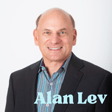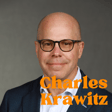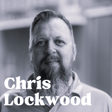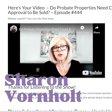Become a Creator today!Start creating today - Share your story with the world!
Start for free
00:00:00
00:00:01

A & N Mortgage Services: Career Building Takes From Entry Level to C-Suite
We're back with Part 2 of my 2023 conversation with Colleen Rudnick and John Horton from A&N Mortgage Services! The both of them are senior executives at A & N who have built lucrative careers assisting single-family homebuyers purchase their residences. This time, we are joined by UIC senior Mark Parages, as well as full-time consultant Bennett Williams: both of whom are in the early stages of building their clientele at the firm.
Transcript
Introduction and Career Beginnings
00:00:00
Speaker
B O O F
00:00:26
Speaker
You know, the big thing is, is when we did before, it was awesome. You were great. Except for the comment you made about wanting younger people. It stung just a little. And you wanted younger in the business, so we kind of mixed it together.
00:00:41
Speaker
Excuse me, Bennett here, has been in the business for about a year or so. 2021, March 21, I started. But worked for Colson, so really didn't have the book of business. So that's kind of what he's doing now. He's building up a new book. And this young fella here is taking his license to be a mortgage loan originator on March 15th. 13th.
00:01:06
Speaker
So someone that's been around that wants to learn the business that's really immersed himself in A&M for a lot, eight, nine months? Yeah, just about eight months now. And also someone that's been in it that's building up their book and business. Sure. Sure.
Industry Experience and Transitions
00:01:21
Speaker
Colleen and John, we heard from you in a previous episode, but I absolutely think you should both recap on your own backgrounds. I don't know if you want to start, even. She's so good and silently insulting. Colleen and John, we've heard from you already. So true.
00:01:36
Speaker
Well, whatever your preference is, introduction-wise, just, you know, some college students are going to be listening to this episode first. So if you get, oh my God, I cannot speak English today. If we could get a little bit of context as to what ANN is, just how long you two have been in the industry, and then we can get into the introduction of the younger folks. Hey now. Go ahead, Kelly.
00:02:03
Speaker
I'm Colleen Renneke, I have been in the business for 25 years now and been with A&N about a year. We are a banker shop and basically about it. Yeah, John Horton, a little over a year, been in the business 33 years, longer than either of these two. And this one.
00:02:27
Speaker
If the college kids are watching this and you're looking for a business to really network, grow your business, be your own boss, and really make homebuyers dreams happen, it's pretty cool. It doesn't get enough press once you're in it and you see how to do it. It's crazy rewarding.
00:02:46
Speaker
Okay. And you guys, are you, I mean, did you start in mortgage right after graduating? What did your degrees look like?
Bennett's Journey from Logistics to Mortgage
00:02:54
Speaker
Is real estate kind of something you've always been open to? Yeah, sorry. Go ahead. For me, I'm Bennett Williams. I've been in the mortgage industry for what, like three years now.
00:03:04
Speaker
coming up on three years and no, I graduated college with Ag Business Management degree from the zoo. I was looking to, you know, like go into, you know, a logistical field within, you know, Ag related. I got into logistics and I was doing the government logistics. So I was working for Allied International.
00:03:34
Speaker
a huge movement company. I was there for five years, got promoted fairly quickly, and it was just unbelievably stressful. Once COVID happened, everything was just
00:03:49
Speaker
ridiculous, ridiculous hours and you know, I was like, there's got to be something better than this. So, kind of got out of that and I told myself I'll never get back into logistics because it was so brutal taxing mentally, physically, it was just awful, in my opinion.
00:04:11
Speaker
Got into the mortgage industry, March of 21, where I was working for mutual home mortgage and that was more of a call center, consumer direct. I didn't need a book of business, leads were provided to me. I did fairly well there given the market conditions and everything.
00:04:37
Speaker
that. So, I got in touch with Colleen here and she sold me on A&N. Next thing you know, I'm here loving it. You know, it's a lot, it's a little different, you know, going out and finding your own business but it's, I mean, it pays off and you know, I've enjoyed it.
00:05:03
Speaker
enjoyed it the early year. I've been here for about five months. Sure. Bennett, was there somebody who introduced you or like a certain mentality that came into play at some event that got you to switch from logistics to mortgages? Because I don't think that's necessarily intuitive, right? Like how did this happen for you?
00:05:25
Speaker
Oh, well, I believe, okay, so back when I was, you know, I was looking for work, you know, I had a buddy in the industry. And, you know, obviously, at the time, everybody's was in 2020 making a killing. Yeah. I
00:05:42
Speaker
I didn't transition directly into mortgage. I ended up working as a warehouse manager for an Amazon, one of the new Amazon warehouses, Wilmington, Illinois.
00:05:57
Speaker
So after that, I kind of slowly transitioned out of that.
Mark's Ambitions and Networking in Mortgage
00:06:01
Speaker
And then 2021 came around. It took me like six months to get licensed. By that time, it wasn't as, the business wasn't as lucrative, I would say, you know, because of the rates, just because of the rates and everything. Yeah. But, you know, I'm very happy that I did make the transition. My life has been a lot less stressful.
00:06:29
Speaker
given those circumstances. But yeah, that's how it happened for me. Okay. I have so many more questions, but Mark, if you want to give us a high-level history, a little bit about yourself. Scott and Mark Paragas. I'm actually still a senior in college. I go to UIC, so just in West Loop.
00:06:49
Speaker
of Chicago, Little Italy for those who are familiar with the area. I'm studying finance. And it's actually a really funny story. You have the time that I could tell. Absolutely, yes. So my father was a contractor. And while I was in my sophomore year of college, I thought, you know, it'd be perfect for us to kind of team up. I'll be a realtor. He'll have that contracting side of everything.
00:07:17
Speaker
fixing flips, things like that. So I had gotten my real estate license. And then one of my extracurricular activities I do at UIC is I played rugby. And our CEO of the company, Nina Blampness, actually founded the women's rugby team when she went to UIC.
00:07:34
Speaker
and the company sponsors it. So she comes out to some of the games and I met her there and we got to talking about real estate and she's like, I'm actually involved in real estate. We come to some of our networking events, get to know everyone and get to know our community here at A&M. I go and from the first time I came here, I met all these wonderful people and many more and I just fell in love with the company. I fell in love with the industry and she convinced me to go ahead and
00:08:04
Speaker
put being a realtor on hold and come here and build up to becoming a loan originator. That's what I've been working to right now and it's been going great so far. I'm curious, what was it about her pitch to you if you remember or just kind of that you've gotten a sense of as you've worked at A&N, but why is being a mortgage broker more appealing than having gone the realtor route? Yeah, that's a great question.
00:08:31
Speaker
And for me, I was a little surprised as well, because, you know, as someone in college, I love to socialize, things like that. So I was like, oh, realtor, perfect. You know, they're doing this all the time. And when I thought of a mortgage broker before I got involved in the industry, I always thought kind of like a banker kind of, you know, always.
00:08:57
Speaker
It's totally not that. It's even sometimes more social than being a realtor because you don't have to do as much comparative analysis and things like that. And you're really just dealing with people, helping them find their homes, working with realtors and the team that you guys are all on to get people their investment dreams.
Becoming a Mortgage Broker: Challenges and Opportunities
00:09:24
Speaker
It really boiled down to it's a more social business in a way, especially here at A&M. And just the great people I found like that I've had so many amazing mentors here, both Colleen and John Horton here have been great to me, really helping me get involved at the company and involved in the industry as well as several other people here. And so that's really what drew me here. Yeah.
00:09:50
Speaker
Well, so Mark and Bennett and Colleen and John, I guess this is a question for everybody, but how does one become a mortgage broker? Mark, I was going to ask how the process is different from becoming a realtor, but Bennett, you had to retrain for this industry to completely. So what does that process look like? Well, it's pretty much similar to becoming a real estate agent.
00:10:15
Speaker
The only thing is there's a little more regulation to becoming a loan originator. Since the 2008 housing market crash and some unfortunate things happening with lending at that time, the mortgage industry has fallen under a lot more scrutiny. So we have to go through background checks, which are through the FBI and some fingerprints and a few other things that you don't have to do as a realtor. But the premise of studying
00:10:45
Speaker
this set of rules and all these things that you don't really get taught in school about real estate and all these regular things, and then taking a proctored exam about that, that is the same between of both of them. Do you guys have anything else to say about getting into it? If you join a true bank, it's the Associated Bank Chase Bank, and you're a loan officer, you're actually under the bank's license.
00:11:14
Speaker
That's where you need a license. So if anyone's interested, banks are not a bad place to start. Yeah. And then the broker places really work. The difference being banks have to stay in their box with their products. If the loan is a little out of the box, we can go outside of our bank and find someone to take it. So a few more options on the loan side. But the test wise is only needed if you go to a broker. If you're in a bank, your license under that bank covers you. Sure.
00:11:40
Speaker
Okay. Bennett, any additional thoughts on training? It's pretty extensive, Mark can tell you. He's been studying for quite some time. And I remember that. I just remember studying for it a few years ago, and it's a lot to take in, for sure. It's not easy.
00:12:04
Speaker
state. It varies by state, so sometimes you need to know different aspects for different states, regulations regarding statewide
00:12:20
Speaker
depending on what state you're in essentially. Yeah. Okay. So once you go through all of this training, I know again, Colleen and John and I did a deep dive on this in their individual episodes. So if you're listening and you guys want to learn about this kind of to an extent that we're probably not going to hit on in this episode, you can just go to Spotify and find that particular one.
00:12:41
Speaker
Um, could you guys give kind of a brief summary of what being a mortgage broker is all about? And then I'd love to ask specifically Mark and Bennett, what it looks like to start building your business. So if he can do kind of like a beginning of career versus middle kind of senior level mortgage brokerage lifestyle, what does that look like? Beginning and starting out, I was actually a telemarketer.
00:13:12
Speaker
And I said, I can write loans. And at that point, that was in 99, we did not have to be federally licensed. So up until I think it was 2004, we had to start taking the Fed test like they are talking about now. And that obviously has increased even more because of compliance and Fed regulation and everything else after 2008.
00:13:37
Speaker
We moved into that.
The Role of Relationships in Mortgage Brokering
00:13:39
Speaker
Uh, this business is like a roller coaster. You know, you started off slow. It's, it's up and down and up and down, depending on the market. And you know, you don't really dictate how that's going to go. So you have to go out and find the business yourself. A lot of network. I mean, this, this business is very much a relationship business. You can build a bunch of relationships. You will succeed. Yeah.
00:14:04
Speaker
Yeah. And the goal is to sell what? So you're dealing with people and helping them solve what particular problem? Financing on their properties. And what, you know, educating them on down payment, down payment assistance. You don't need 20% to buy a home. How to save, how to get their credit where it needs to be for certain products and parameters and things that we have.
00:14:28
Speaker
And that's, I mean, that's pretty much what we're doing with the customer, us working with everybody out there to bring the customers into us. Okay. And Colleen, you said you've been in the industry for 20 years, if I remember correctly, just about. Okay. Right. So that's a huge network. I can't even imagine that you've put together over the years. Bennett, how difficult is it to start a business? Like,
00:14:55
Speaker
Has it been relatively smooth sailing for you? Are you naturally extroverted? What has your experience been? It's been fairly easy. It's all relationship-based. It's all about who do you want to work with. In my experience, coming from the call center, I got
00:15:23
Speaker
very good at, you know, just being on the phone. And it came down to like, you know, who's going to be there for you? Who's going to get you to the closing table? Who's going to, you know, answer the phone because nowadays
00:15:38
Speaker
especially the younger crowd, they don't like answering their phone. It's true though. I've had high school kids that way. I'm not that that young. So I would always, you know,
00:15:59
Speaker
I would always have a client say, hey, my loan officer isn't responding to me and come to find out that they're just not answering the phone. I'll look them up. Everybody has access to everything. You can see their reviews. I'd look them up and there's not much there. So then for me, it's just being reliable, dependable, and knowing your stuff.
00:16:28
Speaker
knowing the ins and outs, what you need to do. And if we can't help somebody get into a home in the timeframe they are expecting to because of a number of things, credit, down payment. If we need to, we'll put them on a plan to get them in a home when it makes sense for them. It's just looking after your clients essentially.
00:16:57
Speaker
Um, so in that aspect, um, it's my, my database is clearly not like Colleen's or John's very small, but the relationships I have are very tight. Yeah. And just to build, I'm gonna do it, but it is the consistency. I was cleaning up the office the other day and I found a list of about 150 past clients. I have not reached out to it.
00:17:27
Speaker
three years four years so yesterday and
00:17:33
Speaker
I sent every single one of them an email. If I didn't have their email, I had their address. I got probably a quarter of those to respond back within 24 hours, possible deals. So I mean, what the hell is wrong with me? How many people am I missing? Then if you don't do it, someone else is going to do it. Don't think you're bothering them. It's such an easy thing to do.
00:18:02
Speaker
It'd be insane. It is my own fault, but it's never too late to start, I guess is what I'm saying. Right. Especially nowadays with all the CRMs that exist, right? Just hundreds of thousands of different spreadsheets you can keep of people's names and contact info and all that. Absolutely. Yeah. Mark, are you waiting to graduate before you officially start at A&N or kind of are you already attending these networking events and building a customer base?
00:18:30
Speaker
Yeah, so kind of what John was just talking about, it's really important to be proactive in this industry. So I'm not trying to wait at all. I'm trying to take my exam as quickly as possible with studying for it. And I'm pretty confident that the network I've already built up has been
00:18:50
Speaker
will pay off quite soon. Because while I have a unique kind of perspective on the market, being still in college, not many people are thinking about, oh, I want to buy my first home. So I'm really working on targeting
00:19:11
Speaker
people who are looking to really get a first investment property, who are maybe a little more cunning with their finances, or they're really looking to be ahead of the crowd in terms of their investments. And I'm also looking to just be that source of education for all my friends
00:19:31
Speaker
for all my classmates, for everyone I meet. Because in the end, I think that's going to pay off with being just another respected professional in the industry who knows the business, knows what's going on, and can be trusted to help finance their dreams. Well, and so that's a really interesting
Specializing in Investor Clients
00:19:51
Speaker
comment. Because as soon as you told me that your dad was a contractor and you guys were considering partnering, it did occur to me that you've got a really cool
00:20:00
Speaker
niche here. If you listen to Bigger Pockets, I know investors on there will always talk about how difficult it is to find realtors who have the interest and experience of working with people like them, whether they're small investors, they're looking to buy little duplexes, triplexes, things like that, or they already have a pretty significant portfolio. It's hard to find real estate professionals who are attuned to that kind of thinking, buying for cashflow, etc.
00:20:26
Speaker
So if you are setting out from the start to be a mortgage broker for investors, it seems to me like that might end up being super, super lucrative for you. But I don't know if that's the case in Chicago. Colleen and John, are there brokers that do market themselves as investor brokers?
00:20:48
Speaker
Yeah. I mean, there definitely are all around the city and I think a lot of higher end realtors, at least in the city, Bellmark. Sure. So I'm going to pivot a little bit. Mark and Bennett, you guys are both guys. So I'm curious how you're going to answer this. But Colleen said in our last, I know that sounds kind of cryptic, in our last recording that being a mortgage broker and interacting with the people
00:21:17
Speaker
Your customers in the way that you do like where they're kind of in a position where they want to get into a house But they've got you know a whole situation going on with their finances timelines things like that You can end up sort of playing the role of like a money therapist or a money psychologist Do you guys get training on how to have those kinds of conversations at an end or do you just kind of have to have like a natural feeling for it and
00:21:45
Speaker
So I'll start, I guess, and then Benny can talk about his experience. I'm not a mortgage broker yet. I'm still stuck for the exam. But even so, like I said, this is a community of mentors here at A&N. And even if you just started or whether you've been here in the business 20 plus years, everybody is out to help each other here at A&N.
00:22:08
Speaker
And even though I haven't become a loan originator yet, I still know so many things about how you can build credit and like planning for budgeting and things like that. So while I didn't receive any formal training and maybe there is and I just haven't received it because I'm not a loan originator yet.
00:22:28
Speaker
I mean, I've learned an incredible amount and have a great perspective on credit and finances just by being around all these talented people. Sure.
00:22:41
Speaker
Yeah. I've noticed since I started here at A&N that health is everywhere and it's unbelievably easy to contact everybody.
Client Understanding and Career Reflections
00:22:50
Speaker
Yeah. If you've got a situation that, you know, doesn't fit the boxes, you know, credits a little iffy, you know, if it's just, you know, not a perfect loan and it's not going to be a perfect loan, you have so many people you can reach out to and, you know, everybody will
00:23:10
Speaker
jump in and help out. I've experienced that firsthand here. And when you are having these discussions on, you know, what should you do, you know, if there's, if, you know, their credit's not there, obviously,
00:23:27
Speaker
There are ways to boost their credit in the time frame that they need. And our job is to advise them what is best for you. It's asking personal questions, asking financially, sometimes difficult questions.
00:23:52
Speaker
And when you do know more about your client, the better you can help them. And so that's my approach and it's always been my approach when it comes to that. Because at the end of the day, we're here to help. Absolutely.
00:24:09
Speaker
Could you guys give some perspective? I guess this question would be specifically for Bennett, Colleen, and John, but if you could go back in time because you all seem to have started in a different industry and found your way into mortgage brokerage, how would you set yourself up as somebody graduating from high school or college to just immediately go in this direction?
00:24:35
Speaker
you know, if you could, I guess, skip over your previous career experiences, or do you think that those were super vital to you being successful as mortgage brokers? Don't know if that question makes sense. No, I did not have a career, but it was college, but straight from college into being a mortgage broker.
00:24:56
Speaker
I don't know if there's anything that I would say different. Just being able to educate people, being able to talk to people, and being able to relationship build. If you need help with that, you know, there's reading, there's all kinds of like psychology. I do have a degree in psychology and I use that every day with my customers.
00:25:18
Speaker
because you do get into personal relationships, personal finance, personal young husband doesn't tell the wife this happened on the credit, wife doesn't tell the husband this, they don't want to tell each other this at all. You kind of have to learn how to cope your way through that situation to help both parties so they stay married in my house.
00:25:41
Speaker
I'm cringing, but that also sounds sort of entertaining. Like John says, just get divorced and buy two houses. Exactly. We'll split it and go. We need Generation 101, yes. How about Bennett and John? Thoughts? For me, I think it was kind of vital for me to, you know, experience, you know, the workforce, you know,
00:26:11
Speaker
I spent my time, you know, kind of like grinding in a different way. And then I kind of realized that, well, I can put, like, I'm very extroverted, outgoing, I'm great at relationship building. And, you know, now that I am in this field,
00:26:30
Speaker
I'm using that to my advantage and it is paying off. So in my aspect, I kind of had to figure that out myself. This isn't a typical nine to five job. You always have to be available and that's usually after 5 p.m. sometimes people get off work depending on who your client is.
00:26:57
Speaker
And the schedule is flexible, but the ones who are succeeding are the ones who have a consistent schedule and they're doing things regularly. And they're on top of everything.
Motivation and Flexibility in Commission Work
00:27:17
Speaker
Also being available is the main thing.
00:27:21
Speaker
And I like to just jump in really quick. But I know a lot of loan originators here, and it's incredible how committed they are to the business, you know, and like, I know at least for me, I hear a lot about, you know, companies, you know, I want to work at a company that has a good work life balance, you know, work this time that I'm off the clock, you know,
00:27:46
Speaker
And it's kind of contrary to how work has been in the US for more and more becoming a full life thing, you know, you're always on the clock. But I think the most successful people just understand that
00:28:04
Speaker
This is a flexible job, but you can kill it if you actually just put in the hours. I mean, I have one coworker here who said by 25, he started just out of college. By 25, he was making over a million dollars a year. And it's not some magic trick. You can pull out his income statement and just see, I close this loan for this amount, this for this amount. And it's all about just,
00:28:32
Speaker
connecting with people and showing that you're competent in the industry. And if you want to be a workhorse, you can make millions. And if you just want to do it as a side hustle, you'll do all right too. But it's really what works for you. I love that. I actually want to touch on that after John answers this question. I think if you're an introvert and you can't
00:28:57
Speaker
manage your time, well, don't get in this business because you'll take that time and just screw yourself over. Just because, number two, it's a commission-based business. So really, if you don't work, you don't get paid. You could be a killer loan officer and the one that used to work three years ago said, you wake up every day at zero.
00:29:19
Speaker
every zero. And then you got to see how you close the day you get a couple days at zero or a couple months at zero. You got to pull yourself out of that because it'll drive you crazy. Having other jobs wasn't beneficial. I think so. You know, and again, I should have used that many other jobs, those people as referral sources of other people to network. It's a tough thing to jump into knowing you're not getting paid unless you sell. And if you're young, you have no network.
00:29:46
Speaker
So you have no network and you're not getting paid. Not very motivational to get out of bed in the morning. But like Mark said, you do have some people that do it part-time. Doing it part-time when you're building up your database, all of a sudden you're starting to come in, now get rid of that part-time job and jump into this full-time. Right. Okay. So John, I love the fact that you also brought up commission because this is my next question and I'm going to end it. That's what you guys do.
00:30:16
Speaker
Nice. That'll be, we'll make that the cover of this episode.
00:30:24
Speaker
So this is for Mark and Bennett specifically because you guys are surrounded by people who work probably nine to five right as W2 workers. Commission is incredibly scary when you interact with friends or you know people family members find out about what it is that you do and how you get paid. How do you
00:30:47
Speaker
like, justify to them that this is a good income model for yourself, if that makes sense. And do you like being commission based, first of all? For me, I love commission structure. Because I mean, yeah, sure, you can have, you know, months where they're not so good. But then you could also have months where you're, you're killing it and you're
00:31:13
Speaker
you make up for it. It always comes back to you if you put the effort in. I've always been routine in my schedule. I'm up at the same time doing my
00:31:30
Speaker
I'll be reaching out to past clients and looking for new business in the mornings. And then after that, I always follow my schedule. And I've found that ever since I got into the industry, it's a lot different now that I'm going out and looking for my own business rather than being fed the leads through the call center.
00:31:59
Speaker
And I like it a lot better because you're compensated better when you are finding your own clients.
00:32:10
Speaker
that to me, I mean, I'm, I find myself in a position where, you know, I am, I'd say I'm okay. I'm at, you know, reaching out, you know, touching base with people and, you know, bringing clients in, you know, so in that aspect, I'm always ahead of the game. I always have something lined up.
00:32:36
Speaker
And if you're not doing that on a consistent basis, then, you know, you are going to see, you know, your commission's going to drop, you're going to deal. But if you're consistently doing everything the way you should be doing it and working, I haven't had an issue with.
00:32:54
Speaker
commissions or anything like that. Sure. Okay. Mark, how about you? I mean, as somebody who's still in college and you're a senior, a lot of your friends are looking for jobs, right? Or accepting offers where they're salaried. What are your thoughts on that compared to the trajectory that you're looking at? For me, I think it goes exactly to what Bennett was saying about you can be as busy as you want to be really in this industry.
00:33:21
Speaker
And it's all about how much you want to work for it. And what I really like about the idea being commissioned is for someone who plays sports and things like that, and I've competed in musical competitions and all kinds of stuff, it really makes me excited from a competitive standpoint to feel like, oh, I have to fight for this. And I have to win this and prove that, you know,
00:33:48
Speaker
I'm more competent or I'm better for the job and things like that. And it really just makes me excited and makes me work a little harder, you know, for all these deals and things like that. And I can't wait till I pass my exams so that I can just go all in on that.
00:34:07
Speaker
I'm so excited for you. That is awesome. So you have like an athletes mentality where you you eat what you kill and you're you're excited to go after that extra revenue because you've earned it. I think most of us here have have that mentality. And while we do attract a lot of athletes, you know, we have people who, you know, played for like competed nationally for water polo or gymnastics or
00:34:36
Speaker
football or whatever. And I think it's just having that kind of mentality of what you were saying, not to be gruesome, but you have to fight for it because there's a lot of people in the industry and it's all about making that impression and standing out.
00:34:55
Speaker
Yeah, that's the truth. Colleen and John, what are your thoughts on commission in general? Like honestly, you guys have seen it all. Like people fail, people do really well. So what are God honest advantages and disadvantages of this path?
00:35:11
Speaker
I've always liked that the sky's the sun. I don't want to be stuck and tied to somebody else's desk and somebody else's, you know, you get X and that's it. Or maybe you get a couple extra dollars here and there for what I want to know that I can make whatever I want.
00:35:27
Speaker
I want to know that I can work as hard as I want or work as little as I want. I'm taking phone calls. Yeah. It might be at eight o'clock at night or it might be on a holiday or whatever, but that's to get the deal done. But then I'm still flexible and making my own schedule. So I've always liked that. That's just me. I want to have this guy's the one that I don't want anyone passing me on. I love that. John, you.
00:35:55
Speaker
You just gotta remember not to complain when it's slow, because it was good for so many years. You have to. And the other thing, kind of like Killeen said, you're self-employed. If you configure yourself being self-employed without all the hassle of...
Adapting to Client Needs and Daily Challenges
00:36:10
Speaker
owning a company. You can come and go if you want. You can do whatever you want. If you need to take off to go to a kid's football game, go ahead. You know, people pitch mode and Realtors drive me crazy. So if there's any listing about how they're always so busy with your license plate that are modified when you have to goddamn lay in your ear, it's rocket science, man. It's one of the best jobs, real estate-wise or mortgage-wise.
00:36:34
Speaker
because I always say it's like garbage day. I know every Monday at home, I'm going to take the garbage out, but every day someone's going to need a mortgage. It's not a fan. It's not something that's going away. With inventory, with range, we'd have a rough year, but hang on to it long enough and it's going to kind of level out for you.
00:36:51
Speaker
And make sure, like Mark said, you have to have the right personality. Like you've just got to cultivate the right face to interact with every single kind of person and then you can make it a little bit. You have to have so many goddamn personalities. That ain't funny. I mean, everyone you pick up the phone, either having a good day or a bad day, man, woman, whatever.
00:37:11
Speaker
be able to mold it you can't you can't be a robot cannot everyone has to be you have to treat everyone like they're your only customer whether your customers are five anytime you're on the phone don't you focus yeah do you i'm curious do you guys have introverted
00:37:28
Speaker
people on your team that do well. And I guess, so we've spoken to lawyers on this show before and I've always asked that question because I know people that I went to school with are hesitant about going to law school because they're not somebody who would want to be in a courtroom, you know, and be defending a client on some criminal charge or something. They don't have that personality. But is it such that as a mortgage broker, you can be non-extroverted and still successful or
00:37:57
Speaker
I think you're going to find those people in our operations department. Okay. Just because they're really detailed oriented underwriters, not that they are, I mean, they're extremely outgoing, but I think if you're introverted, you don't want to meet people, who are you going to do deals for? Right. You can't do deals unless you meet people. But if you like the business and you're technically and analytically inclined that way, get on the upside, get in processing, you're closing, you're under so many different things you can do. Eventually, if you get out of your shell,
00:38:25
Speaker
Now you know the back end of the business, jump into the front end of it. Understood. This is another question that everybody can answer because we're all at different points in our careers. But what does your every day look like? And Bennett, you kind of touched on segmenting your day into spending the morning looking for a new business and then following up with people. John, you emphasize that too. Could you guys run us through a seven to seven, nine to five, whatever your typical schedule looks like?
00:38:55
Speaker
Boy, my typical day is kind of all this place. I mean, I have segmented things where, you know, in the morning I get up, I work out a little bit, then I make my phone calls for the day or I send the emails for the day prospecting. Then I may have a lunch meeting or I may have a happy hour meeting or a dinner meeting. And if I don't have the happy hour dinner meeting, then I'm coming home and following up with customers that have maybe called me back from the morning or
00:39:24
Speaker
dealing with fires that may be happening on certain deals. And that's kind of how every day pretty much runs for me. Yeah. Okay. So definitely varies a lot. There, there's no typical for you. Okay. But it, um, yeah, you can find me doing the same routine every morning. I'm very, I'll get up. I'm never really, I'll get up early. I'll do my workout and then, you know, I'll hop on the phone. I'm,
00:39:52
Speaker
I'm constantly in contact with all my clients, real estate agents, men. I'm reaching out prospecting, looking for new business. A lot of the times it's people you already know. And you've always got to ask. And don't be afraid to ask. I mean, what's the worst that someone can say, no? Yeah. Right.
00:40:23
Speaker
move on to the next. I mean, it's just don't just don't forget to do that. But yeah, morning and afternoon, morning, I'm prospecting, you know, shooting up my emails up until, you know, usually around like nine. So, you know, lunchtime, then I'm prospecting, you know, and then after that, you do have somebody on the phone
00:40:47
Speaker
And they're not available. Call me back at five, you know, that's on my schedule. So it's, it does vary. It's not going to be the same every single day, like how, um, but you know, that front half prospecting, you have to do that. Um, you're slacking, you'll see it in your production for sure.
00:41:10
Speaker
Absolutely. And in the evening, do your own thing and then work like later at eight or eight or nine p.m. Nine seems kind of crazy, but I don't know if that's a reality for you. Oh, can you cut out for a second what the.
00:41:24
Speaker
Oh, I was following up just on the evening portion and Colleen, I don't know if you want to touch on this too, but do you guys tend to like take a little bit of time for yourselves at night and then have to jump back into interacting with clients or do you only have to take those calls kind of on occasion if there is a fire or somebody needs something?
00:41:43
Speaker
If I am finishing up files and stuff like that, I will go into the evening, depending if I'm done and off my plate before the morning. That's just how I am, a little bit type of day. But if the phone does ring and it is a new customer or someone that needs to be talked to at that point in time, yeah, it's 9 o'clock at night, I'm picking up the phone, I'm lost my sleep.
00:42:03
Speaker
Yeah. Similar for me. If I do have a call come in that something's going on, I'm going to take care of it. And then the following day, I will just call the day early if I have everything done. It's all about time blocking in this industry.
00:42:27
Speaker
You have to be able to, you know, set side of time to look for that, to prospect, to look for that new business. And also don't forget to follow up with your past and your current clients. Let them know you're here. Let them know that you're there to help. And essentially it's all about who you know and, you know, getting your name out there and letting everybody know that.
00:42:55
Speaker
you're there to help, essentially. You've got the service. You can offer these products. Just get the word out. And knowing what you're knowing, knowing all the programs that you need to know what you're talking about as well. Yeah. Okay. But you definitely can't be super caught up in the time blocking. Like I can't answer my phone from this time to this time because I'm prospecting. You want to do that, but if a call is coming in, you have to be flexible and be able to change. Yeah. Don't be rigid, basically. Got it.
00:43:24
Speaker
Mark, I am so curious on your take too as a student. So this is something that I also hear from high school students is that they're afraid to get internships or really explore career stuff because it's going to interfere with classes. I want to hear how you handle this. I feel like I've been very lucky with finding a place here at A&M because
00:43:45
Speaker
What they're saying is pretty much you need to be incredibly flexible. And that actually lends itself to being involved in other things. So like for me, I mean, I'm a full time student still. I'm taking about 16 or 17 credit hours right now. Wow.
00:44:07
Speaker
So from, let's see, on Mondays and Wednesday, I'm in school from 10am to 8.30pm. And if I see I missed a call from either a coworker or someone else in my in-between break time, I pick it up and give them a call back. And then it's all about just providing an expectation. So if I say, you know what, I'm in class until this amount of time,
00:44:31
Speaker
Let me get back to you either later on tonight or even the next day. You really lose if you don't follow up and you don't set an expectation that's reasonable for both you and whoever you're talking with. That's when you kind of get a bad reputation and you turn people off.
00:44:49
Speaker
For me, I have the school. I'm also president of a Caribbean club at my university. And I go to this place in Chicago called M Hub a
Balancing Career, Education, and Personal Life
00:45:01
Speaker
lot. It's like a maker space. Yes. So I'm involved in a lot of things. I love the flexibility that this kind of job can provide for me where, like they said, you don't have to be here exactly at this time. You're always kind of working.
00:45:18
Speaker
you have a lot of room to play with how you want to manage things. And for me, I like to focus on a lot of different things, you know, and this helps me with that because I can do a task and if I'm not really feeling motivated for this, I can jump to another task and still be productive and still get things done, but without compromising really my efficiency.
00:45:46
Speaker
So are you planning on eventually still partnering with your dad so that he can do his flips? Or are you going to put that on hold and then focus on your broker business for a few years? So because I'm so new, I've talked to a couple just like incredible industry leaders. And all the advice I've heard is,
00:46:09
Speaker
They've never met someone incredibly successful who is both a realtor and a loan originator. And I'm set up in that position to have both of those licenses soon.
00:46:23
Speaker
And what I think I'm gonna do is I'm going to start off maybe playing around with both. You know why I'm still building that book of business saying, hey, I can provide this service to you or this service or both, however you wanna do it. As long as it's disclosed properly, then you're not gonna run into issues. But eventually I'm gonna pick one and then just go all in. Love it. Love it. John, do you wanna give us a breakdown of your days?
00:46:52
Speaker
Yeah, well you've already called me old after my Denny's dinner at four o'clock to watch Wheel of Fortune and I go right to bed. That's after the day. You know, one of the things I think people need to know where you're at. Every morning I change my message, my greeting, and my voicemail. Not that people only just text it, but they'll know exactly where I am today and meeting until three o'clock. So anyone that called me or emailed me knows I'm not going to get back to them until three o'clock or after.
00:47:18
Speaker
But it is the flexibility, it is the prospecting. You know, I put everything in my calendar. And like Colleen said, if you get a realtor and you say, I got a borrower, can they call you at night? Absolutely. Because you'd be surprised how many people will not do that, will not take their calls. So they may lose a lender, you picked up a deal. But again, you might be so good at emailing yourself just to make sure it still works. So there's so many different
00:47:44
Speaker
horizons on this it's nuts you just got to make sure you're still doing the same thing because when it's that slow or the sun is out or whatever the case is you're working Saturdays and Sundays but you know what you might take Monday off so it's just really letting people know where you're at doing things like this staying on social media posting and just being the first person they think of when they want a mortgage okay so this industry is not for the irresponsible period if you're not organized you're not gonna make it
00:48:15
Speaker
If you've got a silver spoon in your mouth and you want to do this for fun, knock your socks off. But if you got to work for a living, you do not want to be your place. It's fun. I mean, it charges up and it really, it really is enjoyable. Um, but you just got to go in and every day. Yeah. So.
00:48:32
Speaker
Actually, John, once again, that's a really good transition to a question that I probably should have asked you guys over email just so you could give it a little bit more in-depth thought, but a spontaneous answer might be even better. I'm inspired to ask this because in my current position, again, I'm surrounded by a bunch of people who are W2 workers and then people who are on commission.
00:48:55
Speaker
kind of killers personality-wise. And among that sector, there are people who will make sure that they're home every day at 4.30. They prioritize their family and activities just as much as work. And you've got other people who pretty much live at the office. I mean, I like leave at 7 p.m., they're here. I come here at 7 a.m., they're in their office. So I get to asking, well, like, what's the point, right? You can be making five, six million dollars a year and
00:49:22
Speaker
What is it for? Because you can work all you want, right? But at the end of the day, we're all aspiring towards a certain lifestyle. And so I have to ask you guys, what are you working for? Five, 10 years, 15 years down the road, where do you want to be? What kind of lifestyle? Do you want to be living? What do you want your
00:49:44
Speaker
priorities to be able to be income wise, time freedom wise, all of that stuff. And if you need a minute to think about it, that's totally valid. You know, I think in 15 years, I'd love to have opinion. You don't retire from this business. I was actually talking to Realtor this morning. Why would you retire? It really isn't rocket science. You get to a certain level, and I think you put in enough work within five, 10,
00:50:10
Speaker
I'll be dead in 15 years. You know, to build up the business where you literally have someone else doing your work for you, not holding your own company, but you go out, make the context, you give them the application, they run with it and you just kind of do whatever you want to do. So.
00:50:25
Speaker
You build it. And that's another nice thing here is if you're working for a regular W2 company, you can work as hard as you want. You're still going to make the same amount. You know, nothing's going to change. So I just think to build up a business where it kind of runs itself and I can, it's almost like collected royalties. You just need to do it.
00:50:44
Speaker
Okay, John, I'm not gonna let you off that easy. What do you want to be doing in your free time? So once you have an assistant and somebody who's actually like filling in the rest of your business, what are you doing for fun? I got a problem. I don't have a hobby. I really don't. I'm bored out of my mind. Honest to God, it's so funny you asked that. I don't really like doing anything and it's horrible to say. My kids are all getting older. I mean, I still hang with them. Yeah. I don't golf. I don't play tennis. I don't know. I don't have a clue.
00:51:14
Speaker
We got some real and that's why I'm going to start asking this question is everybody seems to be a workaholic and we need to have like a bigger why for life than that. There's nothing wrong with working obviously, but like I'm on a mission to figure out what my hobbies are too. So I relate to that. Let's start painting. I'll meet you at the pickle ball court. All right. Anybody else who wants to go next?
00:51:40
Speaker
I'd say for me, obviously, I'm not looking to retire slow down within the next 10 to 15 years. But gradually, as you start building up your business in the long term, I'd like to have a family, but also commit more time to my hobbies. Like I said, I play the saxophone. I'm involved in a lot of
00:52:07
Speaker
with a lot of creatives whether they're artists or whether they're making you know really unique products that want to shake up the market. I love just getting out there seeing what people are doing getting involved so there's always something for me to do so I'm really excited that right now I can still have a balance with that a bit and you know dedicate some time to that and with the future hopefully it'll just continue to grow into really just
00:52:35
Speaker
you know, work and life being so, you know, flexible that, you know, wherever I feel drawn, I can go without, you know, really setting something fully down, you know. So I'm excited for that. For me, I love playing hockey. I played hockey all the way through college. So I do that on my free time as much as I can. Fortunately, not competitively anymore.
00:53:04
Speaker
But I do still set aside time, just not as much as I would like to. Everybody wants to go on vacation. I do snowboard as well. I go once a year. I couldn't go this year. But I snowboard hockey and fish. Those are my three main hobbies.
00:53:30
Speaker
And so, you know, I do spend time doing those things, but, you know, within reason.
00:53:38
Speaker
You've got to, I'm putting in all the efforts now to where I don't, I don't ever want to live outside my needs. I don't want to be living on credit cards. I don't want to be living paycheck to paycheck. That's all up to me. And that's what I love about it. So I have that competitive mentality where like, I want to strive for that lifestyle where I don't ever have to worry.
00:54:07
Speaker
financially, I know I'm solid. That is the goal for me. Stay single. But yeah, that's, you know, and I would say, you know, if, I would say that's how I would, I would like to, you know, see myself in 10, 15 years, you know, this financial stability. Yeah.
00:54:37
Speaker
Oh, that resonates so hard. I was going to jump in there and ask where you're snowboarding because you guys are all based in Chicago, right? I'm assuming nobody's like a remote. Okay. Do you go to Wisconsin or? Uh, I Colorado trip once a year with, uh, all my, uh, my high school and a couple of college friends would go once a year. Love it. Yeah. Colleen, how about you? Big question. I know.
00:55:03
Speaker
I don't see myself ever retiring. I have to be doing something all the time and I do love my work. But
Building Independent Businesses and Harmonizing Work-Life
00:55:11
Speaker
I will, something like John, build up a team where I'm not focused on writing as many deals and just kind of networking and handing them off. Probably spend more time at my lake house. I love boating. You know, go lay on the beach.
00:55:31
Speaker
But besides that, no, I think I will always work. Kind of like my dad that way, will always do something to keep the mind moving. Yeah. And I hope you've also watched that really in this industry, this handoff that John and Colleen are both talking about is really kind of like a stage of where you want to end up. It's like,
00:55:57
Speaker
uh some crazy aspiration, everybody wants to get to that point where you know they've built up this amazing network of people who trust them and their team and then they're just the face of you know the operation and you know shaking hands and talking with people and then the loans go and then they go to your team and then
00:56:20
Speaker
You just do what you're good at. I feel like we're all great at talking with people and dealing with people. And other people are great at more detail-oriented things and things like that. So it's not like we say, oh, we never want to stop
Advice for Aspiring Mortgage Professionals
00:56:37
Speaker
working. And it's like some crazy thing. It's like the work just kind of changes to more being social and what you're doing. Yeah.
00:56:48
Speaker
essentially is telling of your work once you hit that level.
00:56:54
Speaker
I was going to say once Colleen answered, and it's exactly what you just said, Bennett, you guys are, from my perspective, building machines, like with the hope that they eventually run themselves. And for some of you guys, like that is the hobby. That's the goal. Like that is what you will continue to enjoy doing in retirement or whatever, even if it's in the more immediate future. But you can also use that sort of passivity to enjoy activities that have nothing to do with work whatsoever.
00:57:27
Speaker
Any other insights that you think high schoolers and people in college should know about your industry? Like even if it's somewhat negative, super positive, but maybe not something I'd be able to like go on Google and search up as somebody who's interested in the field.
00:57:45
Speaker
I would just say that for me, it's really given me an incredible lens into investments and specifically real estate investments. I walk around now, wherever I am, little Italy, downtown.
00:58:03
Speaker
And I think to myself, you know, I wonder how much this costs. I wonder how they finance and what programs they use. You know, do they get a construction on all these things? And it just helps you think in a really creative way about investment and kind of demystifies, you know, becoming wealthy because, you know, we'll do it. And it's really possible if you know where to look and you have the right team. So.
00:58:33
Speaker
But if you're interested in this, pick up the phone and call a lender. Call a loan officer. I want to sit with you. I want to interview you. I want to come to work with you. I want to see what you do. You're not going to obviously see the whole picture in a few hours, but
00:58:47
Speaker
Google and stuff is fine, but to sit down and go face to face and actually interview, do it for a class project, do it for extra credit, whatever it is, and just hear the real ins and outs. It's not all glory, but we wouldn't be doing it this long. Once you do it, you couldn't do anything else. Once you're selling cars, you couldn't imagine getting the mortgage on the street. I couldn't imagine selling cars because you kind of got your network, you know what you do, and you think you know what you do. So yeah, if you're thinking about it,
00:59:13
Speaker
Do a little research and then pick up the phone. And we're all available if anybody wants to reach out to us. I can put your contact information in the show notes too for whoever's willing. Does A&N have an internship program?
00:59:27
Speaker
I'll take that one just because I was kind of brought on initially as like an intern and yeah so I think the formal title I was getting was concierge desk but I pretty much was an intern and it was a really great like
00:59:47
Speaker
Shallow step into everything that happens here, you know, they kind of had me sit down with a lot of people Just see what part of the mortgage process I really connected with the most and was able to Digest it in you know small bites and then you know as I continued to stay here I just kept going deeper and deeper into all the mechanisms that go into you know Getting a deal and then closing it and then that turning into you know
01:00:17
Speaker
money that's accessible for people to put it towards property. So I think while it's not technically a formal intern program, I think, yeah, we definitely have an internship opportunity. And if anyone's looking to get involved, we definitely have open doors for that.
01:00:37
Speaker
I love that you got involved as young as you are, honestly. Again, I think way too many high schoolers are nervous or college students even are nervous about feeling under qualified or overwhelmed by balancing their schoolwork with that career exploration. But clearly it's possible. And you found something that you're incredibly interested in, obviously. So that's great.
01:00:59
Speaker
I think that a lot of people have a false impression that they maybe don't have good time management skills. But it's just that they might not have enough on their plate that they don't really have a need to have a real balance and develop task prioritization and things like that. And I would say balancing both these things has been an incredible opportunity in itself, school and work. That's what I mean.
01:01:29
Speaker
Um, and it's really helped me develop, you know, professionally and personally. Guys, this has been spectacular. Thank you so much. I love this round table format actually, like way more than I thought I would. Thank you very much. Thank you.



















